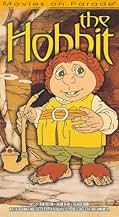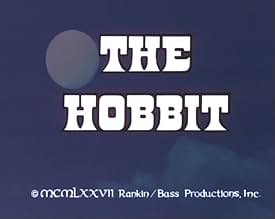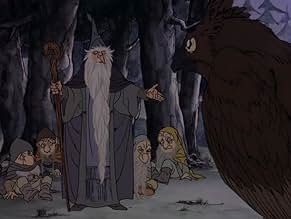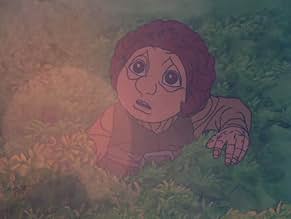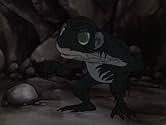AVALIAÇÃO DA IMDb
6,7/10
18 mil
SUA AVALIAÇÃO
Adicionar um enredo no seu idiomaA homebody hobbit in Middle Earth gets talked into joining a quest with a group of dwarves to recover their treasure from a dragon.A homebody hobbit in Middle Earth gets talked into joining a quest with a group of dwarves to recover their treasure from a dragon.A homebody hobbit in Middle Earth gets talked into joining a quest with a group of dwarves to recover their treasure from a dragon.
- Direção
- Roteiristas
- Artistas
- Prêmios
- 1 vitória e 2 indicações no total
Orson Bean
- Bilbo Baggins
- (narração)
John Huston
- Gandalf The Grey
- (narração)
Theodore Gottlieb
- Gollum
- (narração)
- (as Theodore)
Cyril Ritchard
- Elrond
- (narração)
Richard Boone
- Smaug
- (narração)
Hans Conried
- Thorin Oakenshield
- (narração)
Otto Preminger
- The Elvenking
- (narração)
Paul Frees
- Bombur
- (narração)
- …
Jack DeLeon
- Dwalin
- (narração)
- (as Jack De Leon)
- …
Don Messick
- Balin
- (narração)
- …
John Stephenson
- Dori
- (narração)
- …
Glenn Yarbrough
- The Balladeer
- (narração)
Thurl Ravenscroft
- Goblin
- (narração)
- (não creditado)
- …
- Direção
- Roteiristas
- Elenco e equipe completos
- Produção, bilheteria e muito mais no IMDbPro
Avaliações em destaque
I must say that I actually remember this movie with fondness. I've read comments that slam the film for either technical faults or the fact that it has left out a number of things.
All these things are true, of course.
Though I thought the artwork itself was quite good, the animation could use some work. Certainly things were left out.
Come on people! Certainly the film is no ten, but it is a decent version, given the fact that to fit the book into a film at all some liberties will be taken. Especially when it seems apparent that the film is aimed at children.
If you can't unwind a bit and just sit back and watch the film without always pointing out every little omission or alteration, then this film will disappoint. But if you can, then give this film a chance.
All these things are true, of course.
Though I thought the artwork itself was quite good, the animation could use some work. Certainly things were left out.
Come on people! Certainly the film is no ten, but it is a decent version, given the fact that to fit the book into a film at all some liberties will be taken. Especially when it seems apparent that the film is aimed at children.
If you can't unwind a bit and just sit back and watch the film without always pointing out every little omission or alteration, then this film will disappoint. But if you can, then give this film a chance.
This was what introduced me to the Lord of the Rings, back in '77, when I was in 6th grade, it got the kids in my class to reading the trilogy and etc. Personally, I was all up for watching this, in the fall of '77, then the local TV station ran something else(MULLIGANS' STEW?!?) in its place. We were crushed in my family. I DID buy the record/sound track instead and listened to it to Death. Loved it-the voices and artwork both.
Didn't actually See this til '85...though had caught parts here and there...my thinking then and now is the same--Rankin-Bass did a fine job with it. Yes its done by Japanese animators, and No it isn't outta Allen Lee or whomever else' kind of drawing. But they stuck some interesting spins on what elves, dwarves, Wizards, Dragons and Hobbits look like, along with trolls and whatever, personally I found it to be interesting.
And how can you knock the voices-I mean-John Huston? Hans Conried, Cyril Ritchard, Theodore Bikel, Richard Boone, Don Messick, Orson Bean-and last but not least-Otto Preminger. Some legends here guys, esp. Otto and JHuston. I loved it! Rankin-Bass did make it more for kids, definately, and took some cuts here and there-Beorn and the Arkenstone bye-bye, for example, and no one is claiming the animation is up to, say, 'Aladdin' standards, but on its own, it works fine.
*** outta ****, pretty good, actually.
And Where is Leonard Maltin's review? somehow he missed this one...
Didn't actually See this til '85...though had caught parts here and there...my thinking then and now is the same--Rankin-Bass did a fine job with it. Yes its done by Japanese animators, and No it isn't outta Allen Lee or whomever else' kind of drawing. But they stuck some interesting spins on what elves, dwarves, Wizards, Dragons and Hobbits look like, along with trolls and whatever, personally I found it to be interesting.
And how can you knock the voices-I mean-John Huston? Hans Conried, Cyril Ritchard, Theodore Bikel, Richard Boone, Don Messick, Orson Bean-and last but not least-Otto Preminger. Some legends here guys, esp. Otto and JHuston. I loved it! Rankin-Bass did make it more for kids, definately, and took some cuts here and there-Beorn and the Arkenstone bye-bye, for example, and no one is claiming the animation is up to, say, 'Aladdin' standards, but on its own, it works fine.
*** outta ****, pretty good, actually.
And Where is Leonard Maltin's review? somehow he missed this one...
When I saw this movie around 1984 it sparked my interest in the Lord of the Rings series. I thought the drawing were outstanding (the thin lines on the characters shows the animators took the time to get details correct). The songs seemed a bit silly, but I thought the directors were trying to reflect the attidude of the book. Although fans of the book might say the movie had an oversimplifed plot, I thought the directors did an excellent job condensing a 200 page story into an adventuorous hour and half movie.
It is heart-warming to see that people are still contributing reviews for this film over 20 years since it first aired on t.v. in 1978. People considering renting it should remember that it was made for television, so don't look for Fantasia-quality animation; however, compared to other animation films I have seen it still looks great, and obviously a labor of love. The stills from certain scenes were so good they printed them as posters, which I kept in my room for a long time. Many characters were dropped out of necessity for television-viewing (it could have easily been as long as the first Ring movie), but the spirit of the book is intact; there is no unecessary carnage or bloodshed, the story is about courage, not violence, and the voice-work is unparalleled. Orson Bean was the perfect choice for Bilbo. If you rent it, watch it with the spirit of a 13 year-old, not the expectations and cynicism of an adult. If you have a 13 year-old who reads, get him a copy of the Hobbit. The film and book are head-and-shoulders above what is presently offered to children on television or in print.
In the context of a television production, eight out of ten stars for me.
In the context of a television production, eight out of ten stars for me.
They pulled out all the stops on this one. A glorious ensemble of voices including the legendary John Huston and Otto Preminger gave life to Tolkien's creation while the outstanding folk and fantasy score illuminates the story.
You'll see why Frodo was supposed to be an actor in his 50's for the LOTR trilogy (though Peter Jackson's opus was well cast anyway in every position).
This will whet your appetite until "Hobbit" is a full-length feature in theatres (fingers crossed) and no doubt, Mr. Jackson and his screenwriters will pull visuals and more from this timeless adaptation.
The only shame of it is annually, Rankin-Bass's Christmas offerings are still aired while The Hobbit and its sister production of Return Of The King (starring Roddy McDowell as Samwise The Brave!) aren't.
Catch that feature too as it picks up where the Ralph Bakshi stab at The Fellowship Of The Rings/Two Towers left off. -Matt Sherman
You'll see why Frodo was supposed to be an actor in his 50's for the LOTR trilogy (though Peter Jackson's opus was well cast anyway in every position).
This will whet your appetite until "Hobbit" is a full-length feature in theatres (fingers crossed) and no doubt, Mr. Jackson and his screenwriters will pull visuals and more from this timeless adaptation.
The only shame of it is annually, Rankin-Bass's Christmas offerings are still aired while The Hobbit and its sister production of Return Of The King (starring Roddy McDowell as Samwise The Brave!) aren't.
Catch that feature too as it picks up where the Ralph Bakshi stab at The Fellowship Of The Rings/Two Towers left off. -Matt Sherman
Você sabia?
- CuriosidadesThe only original song lyrics in the movie are those to "The Greatest Adventure" and other sections where that melody is used. All others are directly from the book as written by J.R.R. Tolkien or adaptations of what he wrote in verse form.
- Erros de gravaçãoBilbo tells the dwarves to "run back to the wood-elf clearing" while he fights a rearguard action against the Mirkwood spiders. However, the company has not yet met the wood-elves. When they reach the clearing, Bilbo notes that the wood-elves "had returned, armed for battle". This is the first time we see the wood-elves. There is a scene from the book which was clearly scripted but is missing from the animation, where the starving dwarves attempt to gate-crash a gathering of wood-elves in a clearing.
- Cenas durante ou pós-créditosThe opening credits list the actor's voices, however Theodore Gottlieb's name is listed as just "Theodore" but no surname.
- Versões alternativasThe 2001 DVD release by Warner Brothers omited a number of sound effects from the origianl Sony VHS release. The sound when characters die; when Sting attacks the Spiders in Mirkwood; Smaug's screams as he attacks Lake Town; the flapping of the Thrush's wings in all scenes; when the arrows bounce off of Smaug and when the Black Arrow pierces Smaug's belly; and the howling of the Wargs during the Battle of Five Armies.
- ConexõesFeatured in Hewy's Animated Movie Reviews: The Top 10 Scariest Animated Monsters (2009)
- Trilhas sonorasThe Greatest Adventure
Composed and Performed by Glenn Yarbrough
Principais escolhas
Faça login para avaliar e ver a lista de recomendações personalizadas
Detalhes
- Data de lançamento
- Países de origem
- Idioma
- Também conhecido como
- The Hobbit
- Locações de filme
- Topcraft studios, Tóquio, Japão(animation work)
- Empresas de produção
- Consulte mais créditos da empresa na IMDbPro
Bilheteria
- Orçamento
- US$ 3.000.000 (estimativa)
Contribua para esta página
Sugerir uma alteração ou adicionar conteúdo ausente



